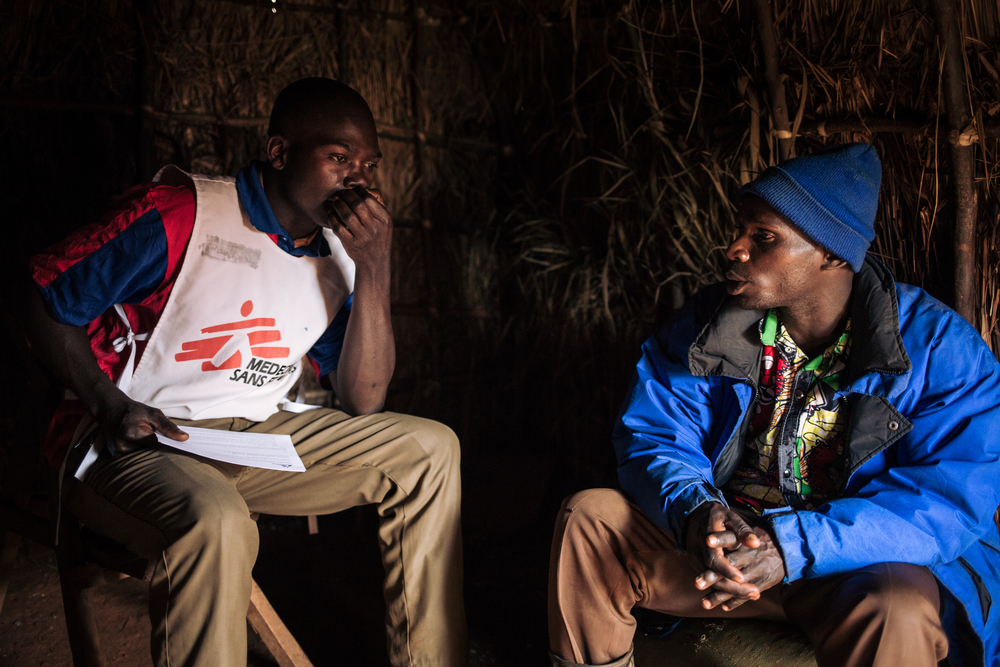“I was a primary school teacher when the conflict forced me to flee from Tché, my home village, about twelve kilometres from Drodro. It was in 2018, five o’clock in the morning and we had to pack up and leave. Well… we didn’t really pack because we left without being able to take even a change of clothes or some food. My family and I walked through the bush and arrived at the site for internally displaced persons of the Drodro parish… for the first time.
The living conditions are bad: there are no food, no access to healthcare, little or no hygiene. I only have one shirt and one pair of trousers. We are living in constant uncertainty. The displaced people rely on daily work in the fields to support themselves, but some days there are no work. At the time, Médecins Sans Frontières is the first organisation to come to the parish. I have been appointed chief of the block of the church building I am living in at the time. I want to work for my community, to try and change things, even if it doesn’t allow me to support myself. That’s how, between April and June 2018, I become a community health educator for MSF in the parish… for the first time.
I want to work for my community, to try and change things ...
In June 2018, an MSF project starts in Tché, my home village, because people are starting to go back. My work doesn’t change, only the location: I am home! At first, I go back-and-forth from the parish, and then decide to move back to Tché to be closer to the community. When the project closes in February 2019, I decide to stay. Well, I think I'm staying. To provide for my family, I open a small shop and sell fish and phone credit refill.
In June 2019, we hear of further violence happening in the region. It is still far from us, so we don’t pay much attention. The attackers are slowly but surely getting closer. On Wednesday 12 June, the village learn that it would be attacked the next day. I am living with my parents, my wife and my children, but we only have one motorbike. How could I get them to safety? I finally manage to transport them in two round trips to the parish camp, still in Drodro. It is 5pm when I come back to Tché to prepare my belongings. This time, leaving empty-handed is not an option. However the attackers are already in the vicinity and they are blocking the road. I have no choice but to stay the night.
Unfortunately, the information received the day before turned out to be true. It is 4am on Thursday 13 June when the assailants attack my village and those who have not yet fled. We are hiding as best we can. Those who choose to flee by road are being slaughtered. I stay hidden for seven hours, waiting for the attackers to leave. Some people stay in the bush for days, without eating or drinking. Escaping have to be done at night, on foot. People are completely exhausted. Finally, I arrive at the site for internally displaced persons of the Drodro parish… for the second time.

November 2019: Djapan speaks to Dieudonné Ngandru Lossi. in his straw shelter at the Rho IDP site, Djugu territory, Ituri Province. In late September 2019, Lossi's wife was shot and killed during a night attack on the IDP site. By November 2019, More than 21,000 people had taken refuge here since mid-2019, gathering on this hill to seek protection from the UN peacekeepers. Despite the presence of military forces, the IDP site was attacked twice in late September 2019 by armed men. [ © Alexis Huguet]
One day, I receive a phone call from MSF’s health promotion manager in Ituri. They are urgently looking for staff and he has kept my contact information: “Djapan, can you come to Bunia so we can talk about work opportunities?” Four hours by motorbike later, and after making a few detours to avoid the militia, I arrive in Bunia. And in July 2019, I become a community health educator in the parish… for the second time.
I have been working since then. We support the community of displaced persons who live in the parish. It is difficult to try and estimate the number of people who are in the camp, but we are many, too many. The living conditions haven’t improved. It affects my work: for example, I cannot keep the documents I use to raise awareness of health issues in the community. With my wife and five children, we decide to leave the camp and move to Dhessa, where we now live. I just hope my children will be able to grow up and thrive in more decent conditions…”
* Nickname
![November 2019, Emmanuel Jilo (left) speaks to Djapan next to the place his shelter was destroyed in an attack on Rho IDP site, Djugu Territory, Ituri Province [© Alexis Huguet] Nov 2019: Emmanuel Jilo (left) speaks to Djapan next to the place his shelter was destroyed in Rho](/sites/default/files/styles/hero_desktop/public/msfimages/news/djapan_msf302252_medium.jpg?itok=9ITpUtg1)